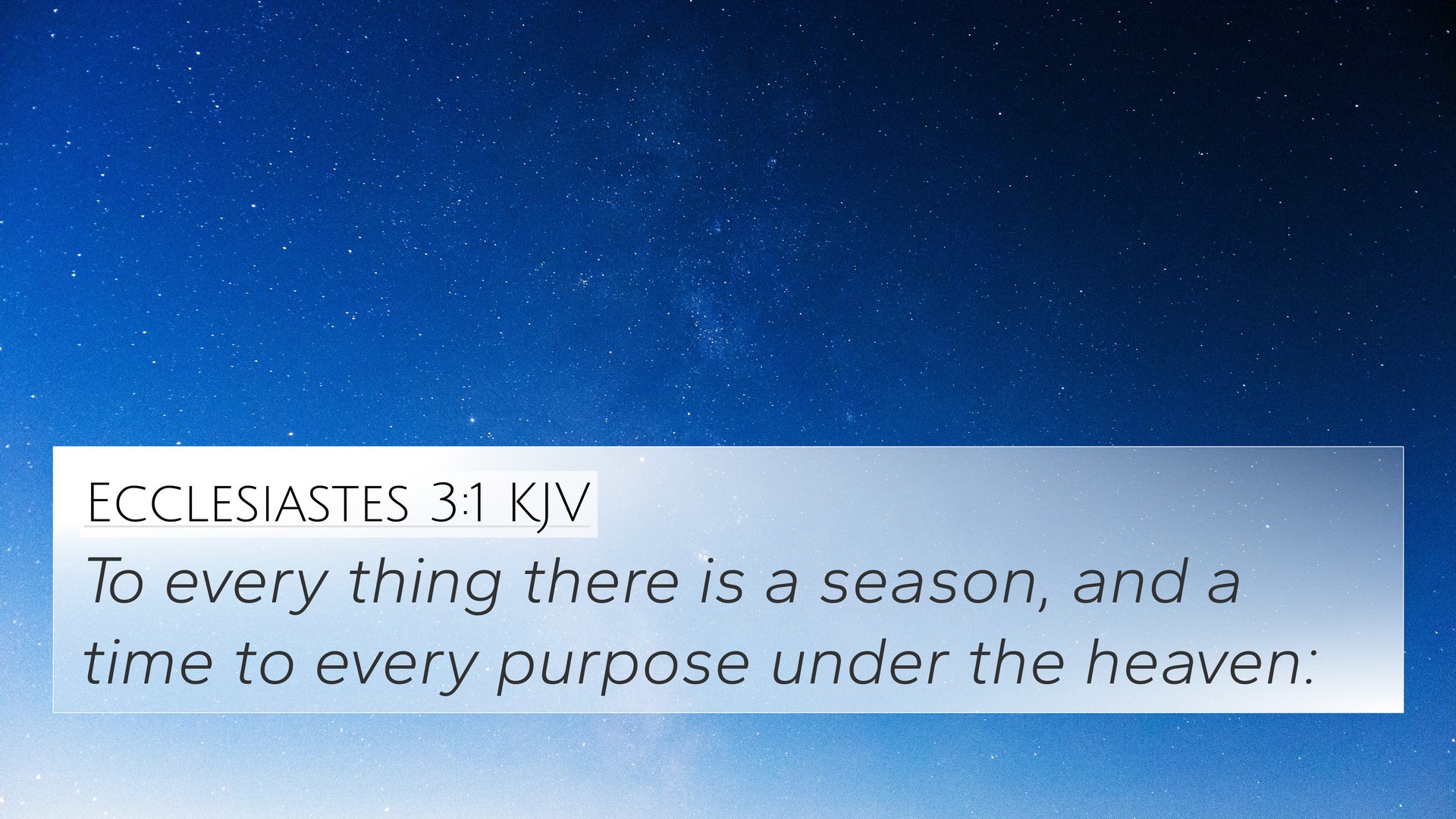Understanding Ecclesiastes 3:1
Ecclesiastes 3:1 states, "To everything, there is a season, and a time for every purpose under heaven." This profound verse speaks to the divine timing of events in our lives as part of God's artistry and plan.
Meaning and Interpretation
In this verse, the Preacher (traditionally understood to be Solomon) conveys the idea that life consists of various seasons, each with its own purpose and timing. This perspective encourages acceptance of life’s fluctuations, understanding that both joy and sorrow have their place.
- Matthew Henry's Commentary: Matthew Henry emphasizes the sovereignty of God in orchestrating the times and seasons of human experience. He notes that while individuals may experience trials or joys, it is ultimately part of God's divine timing.
- Albert Barnes' Notes: Barnes elaborates on the philosophical aspect of the verse, suggesting that recognizing and embracing the seasons of life can bring comfort to believers. These seasons remind us of the transitory nature of earthly experiences.
- Adam Clarke's Commentary: Clarke focuses on the necessity of discernment in recognizing the appropriate actions for each season—suggesting that wisdom involves identifying the right time for actions and responses in life.
Cross-References for Ecclesiastes 3:1
This verse connects significantly with other scriptures in the Bible, enhancing its meaning through cross-references. Here are some noteworthy connections:
- Genesis 1:14: Discusses the creation of time and seasons as a divine gift.
- Psalm 31:15: A reminder that our times are in God's hands, reassuring us that He governs our seasons.
- Isaiah 40:30-31: Encourages believers to wait on the Lord, emphasizing renewing strength in times of weariness.
- Galatians 6:9: Highlights the importance of perseverance, as certain fruits of the spirit emerge over time.
- James 4:13-15: Discusses the uncertainty of life and the need to submit our plans to God’s timing.
- Romans 8:28: Affirms that all things work together for good, validating the idea of God’s orchestrated timing.
- Revelation 21:4: Promises a future without sorrow, contrasting the present seasons of life.
Theological Themes
The verse embodies several theological themes relevant to Christian life:
- Divine Sovereignty: Understanding that God has established a timeline for creation.
- Human Experience: Recognizing that each phase of life serves a purpose in our spiritual journey.
- Hope and Assurance: Encouraging believers to trust in God’s perfect timing amidst life’s uncertainties.
Tools for Cross-Referencing
To further explore cross-references like those listed above, consider using:
- Bible concordance to find related verses.
- Bible cross-reference guide to help locate connections among scriptures.
- Comprehensive Bible cross-reference materials that provide detailed analysis.
- Cross-reference Bible study methods to deepen your understanding of thematic connections.
Practical Applications
Reflecting on Ecclesiastes 3:1 can serve as a guide for several practical applications:
- Embrace Change: Learning to accept life’s seasons can bring peace and resilience.
- Prioritize Waiting: In a fast-paced world, waiting on God's timing fosters patience and faith.
- Seek Wisdom: Actively pursue discernment to understand what is appropriate for each season.
In conclusion, Ecclesiastes 3:1 offers profound wisdom about the nature of time and purpose in our lives. As we delve deeper into understanding this verse, utilizing tools for cross-referencing and studying the thematic connections enriches our spiritual knowledge. Each season brings a unique opportunity to grow and trust in God's overarching plan for our lives.












